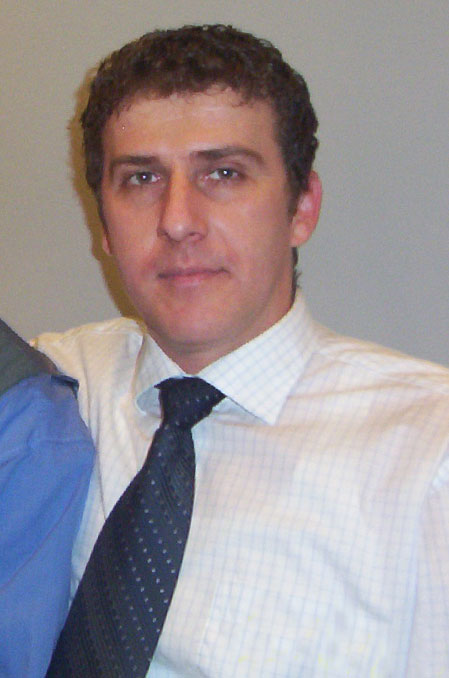
Saso
I thought it would be interesting to hear from a place which is close to Germany and see to what extent the games phenomenon there has diffused outward, so this time we go to Eastern Europe to talk to Saso Stamenkovic. He hails from one of the newest countries in the world, which nevertheless was famous in ancient times, and a place that few of us in the Western world know much about today. I asked Saso to begin by telling us a little bit about himself and where he lives ... January 28, 2006 ...
My name is Saso Stamenkovic and I live in Skopje, the capital of Macedonia. That is a small state in Europe, where Eastern and Western culture shake hands, with no more than 2 milion people, that formed after the fall of Yugoslavia. Perhaps , the people who visit your webpage would not know of my country. My town is so called "historically recognized", mostly because Mother Theresa was born here.
By the way, board games are one of my many hobbies, but I also fancy other type of games like MMO's and another PC video games. I must say that the specific "love" for board games gave birth many years ago, learning about them and enjoying in the company of my friends, matches that often could last till early mornings. At breakfast time, we could not decide who is better than whom, so we would often go back to my flat and play Risk again and again... Later it was Settlers [of Catan] which occupied our free time.
Moreover, I work as a Sales Specialist in an Information Technology (IT) company and therefore have little time to enjoy my beloved hobbies.

Saso |
2. What can you tell us about game players in your country? What types of people are playing and what games do they like to play?
I think that just as at any place in the world, board games possess a magic that captivates people here and gives them an opportunity to have fun that can be shared with others. There might be some differences with, say, the average gamer in Germany who can buy 20 games a year and the Macedonian one who would buy just one, but I don't believe that one country has more gaming desire than any other.
This is more a matter of standards, public opinions and marketing campaigns that by publishing or re-seller companies that sadly do not exist in Macedonia. However, I believe there is a market in Macedonia, but since there are few products that come through and there is almost no presentation of board games, that field remains unused and unexplored.
Moreover, I think that the moment when one disconnects from the real world by playing a game, one discovers the inner will to win and accomplish something in a fun and harmless way, which exists in every human being. I had a chance to watch some tournaments (e.g. Magic: the Gathering), and many different types of people joined in: kids, mature individuals and folks of various professions.
Many of my friends too, who participate in my board game matches, are people with families and serious responsibilities, but they manage to find some time to devot to simple gaming fun.
I must admit that the problem in my country is that we have almost no shops offering quality board games of different types. Our only comfort is a small shop that at least has the most popular titles like Settlers, Puerto Rico, D&D, War of the Ring, Age of Mythology and so on. Young people especially are captivated by Magic: the Gathering at the moment and therefore they enjoy international tournaments where they can match themselves against one another.
3. What languages are most common in your country? Is your country receiving German or English editions? How do players deal with the language issue? Are there any popular board game websites, possibly ones that help with translations?All games that are being sold in here, both Board and PC games are English editions. I have not seen, but there yet may be some rare German editions.
Our main language is of course Macedonian, but English is also well known, so we don't have any problems regarding the rules or the very concept of games.
Since we are a small country, I believe that none expect to see the games like Lord of the Rings in Macedonian, but also it would be a great change that could increase the interest and the sales of the board games. Native language editions of such games, followed by commercials, should multiply the sales of the products. I think that even if we would address "Sophisticated Games" for a Macedonian edition, knowing of our small population, we would do nothing.
An example is the fact that even Microsoft, published Windows XP on Macedonian this year. I think that with this move they lost more money than they gained, but they simply had to cover this region.
Moreover, some gamers buy German editions when they travel to other countries, but they manage somehow with the language since there are many web pages where you can download the rules of specific games in English and so on.
I also would add that there are Macedonian editions only for Monopoly and Risk, but those are made with poor quality, without proper license and authorization of the rightful owners of those products.
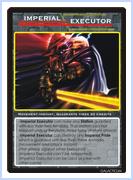
card from Saso's game design (Imperial Executor) |
4. Which traditional board or card games are popular in your country?Backgammon is a traditional board game, which is most popular in these regions. We know that it came into Europe, through the Mediterranean, since the beginning of the new age, from Egypt through Greece, which is our southern neighbor. I think that game was played even before it became popular within the Roman Empire.
The card games are also more or less popular, and the games usually played are Bridge, Bellot and so called Tablanet. The social entertainment however, seems to turn to the board games in the later years, since the older card games I mentioned are avoided by the new generation of young people.
5. Can you tell us something more about Bellot and Tablanet?Bellot is a card game, similar to Hearts, brought to Macedonian by the French Army in World War I which has become widely popular. It is played strictly in pairs. At the beginning of the game, players choose a power suit or pass. Power suit cards (such as the hearts in Hearts) are more powerful and can get you a big score. The team that chooses the power suit must make more than a half of the possible score, or the entire score goes to the opponents. That's why it is not always wise to take the game if you have weak cards. It is played with the cards A-7 and the full score is 162. However, there is the factor of surprise; if someone has a straight flush (3, 4 or 5 cards) or four of a kind he receives bonus points that significantly influence the result.
Tablanet is for 2 or 4 players with a standard deck of 52 cards. Each player gets 6 cards, while on the table there are 4 open cards. The aim is to collect table cards with a card in your hand that equals the sum of the numbers on the table. Cards can also be "taken" if some card in your hand is identical with the one that lays on the top of the table cards.
Each player, when it's his turn, has right to "gather" cards according to the rules, or if he has no options he must drop a card of his choice. At the end, the aim is to collect more 10's, J's, Q's, K's and aces. They are the only ones that count after each completed match, but the player who has more cards of each type also gets +3 points. The winner is the one who first reaches the number of 101. If there are two players the game usually lasts 6-7 matches.
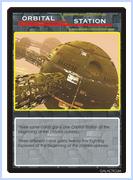
card from Saso's game design (Orbital Station) |
7. Interesting. Tablanet sounds much like Cassino, also Safarü in Doris & Frank's Mu & Mehr. Do you know any of the games that have been set in Macecdonia, either past or present, and what do you think of them?Yes, there are many historical battle oriented board games from the time of Antic Macedonia, or more accurately from the time of Alexander the great and shortly after his death. I can mention Conquest of the Empire, Diadochoi - A divided uncompleted empire, Empires of the Ancient World, Hellas: Peloponnesian War, etc.
There are other strategies where Macedonia is mentioned, because that period of Europe is an everlasting source for tales that are done with good mechanics and glamour, which proves that that period is attractive for the gamers. I will not go into the mechanics of the mentioned games, because sadly I had not the time to play them.
What I have to say about these games is that there are historical aspects in them with which I do not totally agree, but that is not a subject to be elaborated at this moment. I hope that I will have a chance to present this period of the European history through some story in my eventually future games. Game publishers classify the games according to story lines, which will be evaluated and which not, even before they take a look at the mechanics. I am convinced that many wonderful game-play mechanics lay somewhere on the shelves, waiting for their chance, only because of not polished storyline or poorly presented themes. Moreover, according to the top charts, the best selling games are those with historical themes, ahead of those that deal with the future – at least in the world of the board games.
8. We don't hear much news from Macedonia usually. The last thing I seem to recall is that we were supposed to call it the "Former Yugoslavian Republic of Macedonia". Is this still true? The existence of FYROM itself indicates a certain level of unhappiness about Macedonia's very existence from someone. Is this still the case or is strife there no longer an active concern?Well, it's sad to say that this is a problem that will not be solved for many years.
In fact, Macedonia has no problems with any country except with Greece. Many countries including USA recognize us with our constitutional name, while Greece fears that the name could bring up aspirations for territories, which is totally absurd.
I would not want to begin to portray history in my own way, but what I think is that Greece doesn't want to give up the historical benefits that are connected to the name of Alexander the Great. Trails that have their influence over culture in the presence and in the past for the two countries.
Fact is that Fillip II formed Macedonia as an empire, and with his vision he formed the foundation of what Alexander would do. Macedonia was at war with Greece and Greece was subdued while Alexander was alive. The only influence that Greece had over the character of Alexander the Great is that Aristotle as a Greek was his teacher and a mentor. After the death of Fillip II, Alexander took Greek soldiers towards Persia as insurance that there would not be any rebellions in the Greek territories.
I'm sad to say that today and centuries before, Greece "embraced" the cultural inheritance that Alexander built, refusing to acknowledge the name of Macedonia that existed even in the time of the Crusaders that passed over these lands. In addition, we were blackmailed many times during the history about our name, coming from economically stronger countries. Thus, we are in a difficult period because we want to be a modern and developed country, but we also do not want to give away our name and we try to accomplish a reasonable deal through negotiations with Greece.
I do not want to deny anyone's right to associate with the deeds and the heritage of Alexander the Great, but thank you that you gave me a chance to hear the other "side".
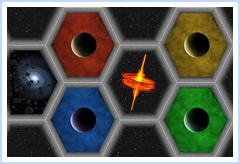
artwork from Saso's game design |
9. Thanks for explaining, Saso. Just to follow up a bit: is the problem strictly between the government then or does it also extend to people? Would you ever sit down to play a board game with a Greek for example?I, of course would not mind to play a board game with a Greek, or any other from any nation. Quite the opposite, a lot of people in example go to Greece for a vacation during the summer. I know a lot of Greeks who are my good friends and they have relaxed point of view concerning this question. Greece is also the biggest investor in the private sector here in Macedonia. The problem lies in the government, but in the conscience of the people too. However, I think that leaders can use their influence over people and relax these relations a bit. In Greece there is anxiety that with the recognition of our name – Macedonia – we might have some territorial requirements towards Greece. That's absurd. As soon as the people in Greece understand our real intention which is of a good nature, we will be able to develop good relations. I understand that they take the name of Macedonia as a part of their history, which is a fact, but they also have to understand that this territory and my people have always been called Macedonians. We have no other name.
Through these territories passed Crusader armies bearing heroes and names that radiate with greatness. The history that breathes from this land pushes us to come to a reasonable agreement. The cultural treasure of these lands is indeed a motive and a good scenario for many board games. I do not even have to talk about movies. Culture, including board games, should be a motive for betterment in any field, not an obstacle.
10. Where do you play your games? In homes? Are there public places to play? Game conventions or conferences?Sadly we do not have fair or "playgrounds" especially for board games. Successful was the try to organize something during the fair for IT (Information Technology) equipment. For now, only Magic: the Gathering is the only successful "fair" game. The attendance for that card game is quite large. Furthermore, every Sunday there are Magic: the Gathering tournaments.
We also try to present some of the board games in the IT magazines from Macedonia in the section of PC games. We aim to make interest for board games through this visual presentation and also to "make" people invent some games. We believe that good motivation would be if the winning game would be presented at some of the world known fairs and the publishers, but also the reward would be a free travel for the winner. Maybe even publishing of that winning game in Macedonia, which would be the most interesting by our judgment? I sincerely believe in working to create "love" for board games among the young population, to show them a world where fun can be great (without a PC).

artwork from Saso's game design |
11. As we go along here we've been featuring – very attractive I must say – photos from your evolving game design. What can you tell us about it?While I'm not professionally involved in the board game industry, a bit naively two years ago I created a board game that I would like to see published. It took about a year while I started to contact some firms in Germany and the USA that are involved in publishing. The effort, time and the answers I got are well known to those who have tried to publish some of their board game ideas. The process is long, the firms need time to evaluate and even if the game is good, each company has long term business plans and they rarely make space for new ideas. You need to put a lot of effort and time and persistence in testing before you even think of publishing your idea. If you do that well, you will shorten the response time and you will have more serious chances for success. Furthermore, every inventor should try and get some help for the graphic presentation of the game. The theme of the game brings a lot of points too.
The name of the game I invented is Galacticum. The balance of the units is there and the graphics and story are good. I do hope that I will finish fine tuning the mechanics by the end of this year. The biggest suggestions I got from the publishing companies is that the science fiction theme is not "commercial" and that may be the biggest problem. That came mostly from the German companies. I will be persistent and try to find a publisher, because I believe that my game can offer good entertainment. That is what i see and feel while I'm play testing. At the moment I'm trying to avoid the "kingmaking" moment when you know the winner and you need to find a way to end it quickly. This moment is what many games have and I had the same problem too.
Galacticum has a wonderful story that provides further embellishment to the rules and theme. In the defined distant future, just as the home planet becomes too "tight" for mankind, humanity discovers abandoned ships and technology which must have once belonged to a mighty alien civilization and has been left untouched and usable. After 35 years of experiments and research, mankind learns how to govern this technology and discovers a new powerful resource that breeds power and opportunities for migration to other planets. Soon after, war arises between the four new worlds of men that fight for the domination over the resources and power.
I would also like to mention that the game can be played by 2-4 players, the map is tail based and every new game has a different look of the galaxy and the positioning of the objects.
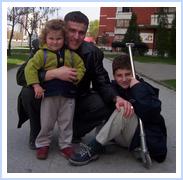
Saso with his children |
12. Is there anything I've left out that you would like to say? And finally, what are the words for game and board game in your language?Like first Rick, I would like to thank you for the patience during this interview and for the opportunity that you gave me to say something about my country and its place in the world of board games. I am also thankful for the chance to present my board game idea that I hope it will be the first invented and published game in Macedonia .
Game = Igra
Board game (we use the same term as in English language )
Thanks very much for your great time and efforts, Saso. Good luck with your game designs.
Links Cited in this Interview:
Spotlight on Games
>
Interviews